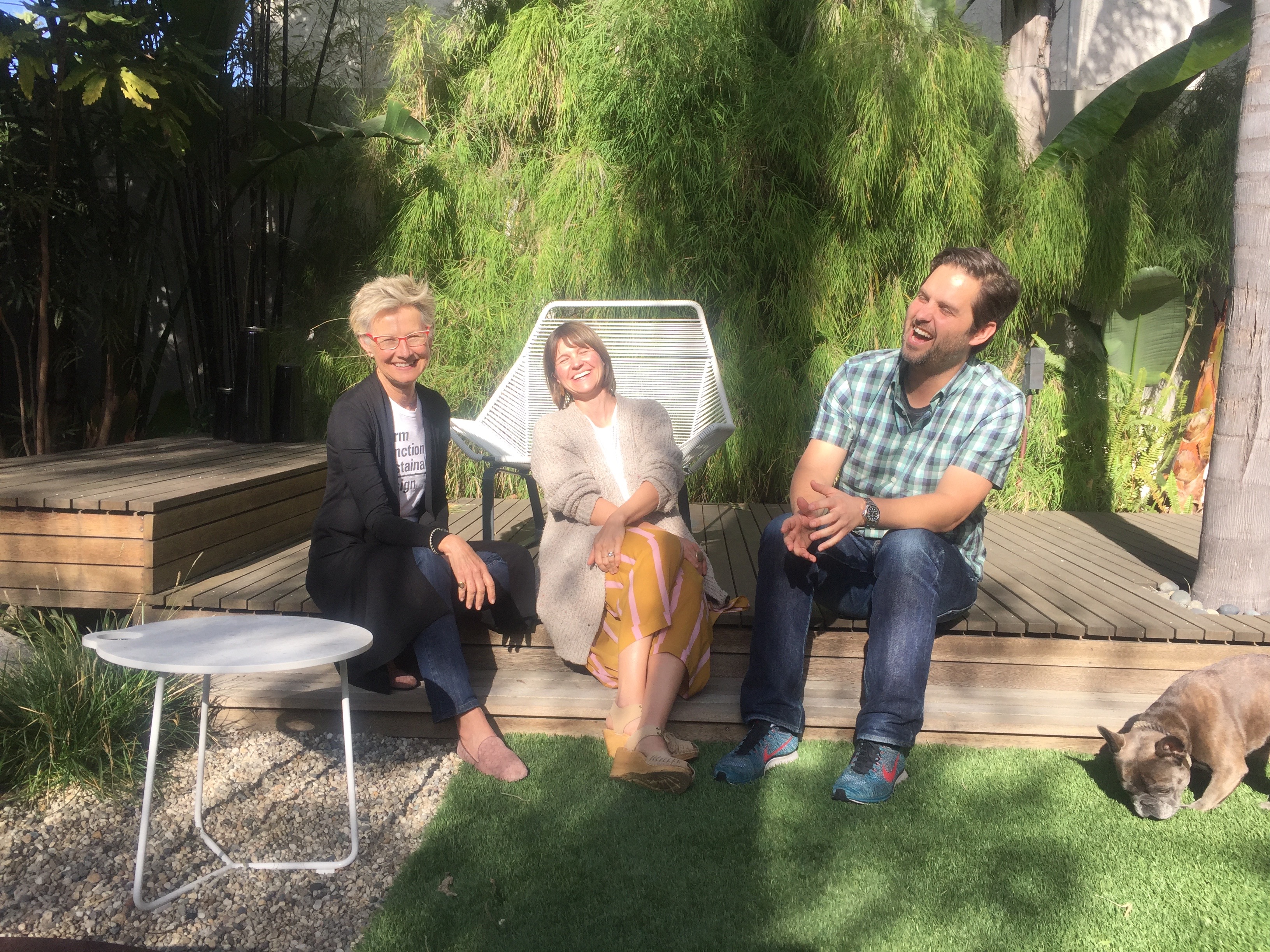
Judges Heidrun Mumper-Drumm, Patagonia’s Carrie Childs and Christian Denhart enjoy a light moment. Photo courtesy Heidrun Mumper-Drumm
Bringing nature back into the urban environment in a cooperative modular living complex, a thrift store that supports a children’s burn clinic in Chile and a graphic novel that brings attention to the perils of over-fishing. These student projects constitute the winning lineup of the sixth annual Denhart Family Sustainability Prize competition.
The awards recognize outstanding projects that integrate sustainability with superior design outcomes, and have the potential to influence art and design education and advance professional practice. In addition to recognition, the student designers are rewarded with significant scholarship funds.
Created through a generous gift from Gun Denhart and her son Product Design alumnus Christian, the annual prizes support students who are making environmental and social criteria a priority of their work. This year’s applications were judged by a team comprised of faculty member and Director of Sustainability Initiatives Heidrun Mumper-Drumm, Christian Denhart and this year’s guest judge, Patagonia Kids Lead Designer Carrie Childs.
The first place prize, a $15,000 scholarship, was awarded to Environmental Design student Adriana Avendano and Product Design student Alejandro Jimenez for Casa Ikiru, a sustainable, modular and cooperative living complex designed to rekindle the symbiotic relationship between humans and nature by reintroducing our natural environment into the urban setting.
The project was developed as a result of the students’ participation in a Designmatters class, Pacific Rim: Eco Research Lab Costa Rica, hosted by Environmental Design, where students from ArtCenter teamed with students from Tama Art University and traveled to Costa Rica for two weeks under the guidance and direction of Environmental Design faculty member James Meraz and his counterpart at Tama. This immersive experience challenged students to draw upon the influences of biomimicry and nature’s biological forms for concepts that reflected symbiotic relationships with natural resources.
On receiving news of the award, Meraz stated, “I am so thrilled and honored that Adriana and Alejandro’s project has been recognized for the Denhart top award. We need to keep pushing towards a sustainable future, and not only by creating opportunities for our students to be learning from nature’s time tested intelligence and performance, but also by guiding them to become stewards and educators for our precious resources.”
Second place and a $10,000 scholarship went to Product Design students Miranda Lapour and Mathew Simon for COANIQUEM red, a thrift store model that can be scaled up to provide financial support for a children’s burn clinic in Chile. The comprehensive design addresses clothing recycling and resale, and the experience of the volunteers that staff the stores.
The third place prize, including a $5,000 scholarship was awarded to Illustration student Cullen Townsend for Overfishing: Salmon fishing in the Pacific Northwest, a compelling graphic novel calling attention to over fishing; in particular, how over-fishing, aquaculture and loss of habitat is affecting the declining salmon population.
The Environmental Design department served as host for the Designmatters classes that produced the first and second prize winners. On hearing the news, Department Chair David Mocarski, gushed, “This is such wonderful news. I know James will be so proud of Adriana and Alejandro for their Casa Ikuru project and Penny [Herscovitch] and Dan [Gottlieb] for Miranda and Mathew and their Designmatters’ Coaniquem project. These are both such wonderful projects. I am very happy to see such great recognition come to our students and faculty.”
The jury also awarded special recognition to two projects:
- Product Design student Charlie Hodges for The Urbanette, a children’s toy that significantly reduces material impacts. The modular, tiny home, provides spaces and activities for make-believe, while encouraging children to imagine what a sustainable future looks like.
- Environmental Design student Anna Meddaugh for Night Loo, a personal toilet for women and girls in refugee camps, that considers their safety and dignity, while using innovative materials and design.








